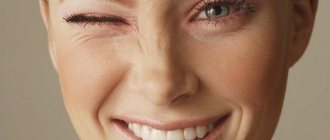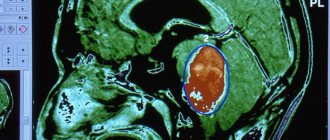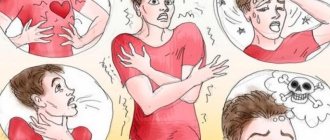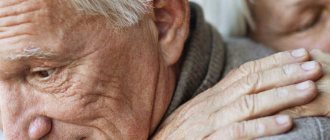Neurosis is a painful and long-term mental disorder, but it is completely reversible and, with timely treatment, is not complicated by additional nervous ailments. Psychological work alone is not always enough, and each patient expects a speedy result (after all, advanced cases take years to treat). Therefore, the doctor prescribes pills for neurosis - as an adjuvant in complex treatment. The drugs significantly alleviate the severe symptoms of neurological disorders, which often interfere with a full fight with one’s own body and soul.
Tablet medications are divided into 5 large groups:
- Antidepressants. When neuroses become overgrown with depression, the sense of vitality decreases so much that the patient is unable to do household chores or go to work. Taking antidepressants helps the patient relearn how to enjoy life. The pills regulate the amount of neurotransmitters in the brain. The effects of this treatment are revealed gradually - over 2-3 weeks. It is very important to tell your doctor about any new conditions associated with taking the prescribed pills.
- Tranquilizers. If neurotic disorders include phobias, panic and insomnia, the doctor will prescribe this type of pill to the patient. “Trunks” affect mental processes, and in different ways. There are drugs that activate the psyche and invigorate a person, and there are relaxing drugs that relieve tension and hand tremors.
- Neuroleptics. If the condition is complicated by anxiety and hysteria, then these tablets for neurosis are the most suitable for the patient. Their active substance suppresses dopamine, a hormone that is responsible for the transmission of nerve impulses. The lower the speed, the calmer the patient will be.
- Nootropics. They are best suited for capturing neurosis in the initial stage, but not for advanced cases. Nootropics help a person in his struggle with himself - they supply the brain with oxygen, improve mood, increase memory and attention. By the way, nootropics are not addictive.
- Auxiliary means. Such tablets are suitable for mild forms of neurosis. They strengthen the central nervous system, relax, and help you fall asleep well. But with severe neuroses, sedatives will be useless.
Review of the most common tablet drugs prescribed for neuroses
| group | approximate price | action | side effects | addictive | |
| Venlafaxine | antidepressant | 206-330 RUR | Improves mood, eliminates nervous disorders, anxiety, increases performance, improves thought processes | Weakness, sensory organ disturbances, tinnitus, blood pressure surges, tachycardia, shortness of breath, skin rashes, suicidal thoughts | Yes |
| Asentra | antidepressant | 634-800 RUR | These are very effective tablets for neuroses, they relieve OCD and other types of nervous disorders, improve mood, and relieve anxiety. | Appetite disturbances, hallucinations, sleep disorders, tachycardia, panic attacks | Yes |
| Paxil | antidepressant | 650-1600 RUR | Relieves OCD, relieves phobias, improves general mental health, relieves depression | Allergies, blood pressure surges, tachycardia, sexual dysfunction, aggression, appetite disorders | Yes |
| Diazepam | tranquilizer | 620 RUR | Removes panic, neuroses, phobias, psychoses, relieves tremors, improves sleep quality | Drowsiness, dullness of emotions, bradycardia, allergies, hallucinations, nightmares | Yes |
| Atarax | tranquilizer | 280 RUR | Relaxes muscle tone, eliminates neuroses, fears and anxieties, promotes “repair” of the psyche, removes nervous tics, improves memory | Gastrointestinal disorders, lethargy, sweating, heart rhythm disturbances, headache, fever | No |
| Phenazepam | tranquilizer | 96-150 RUR | Blocks neuroses, anxieties and fears completely, makes the patient slow, sleepy, satisfied | Tachycardia, sharp decrease in blood pressure, deep sleep (inability to wake up from an alarm clock), gastrointestinal disorders, unpredictable mental reactions (even suicidal thoughts) | Yes |
| Freesium | tranquilizer | 2500 RUR | These are pills for neurosis of various types: OCD, neurasthenia, hysteria. Also relieves anxiety, tremors, spasms, tension and insomnia | Fatigue, poor attention, dry mucous membranes, nausea, appetite disorders, allergies, tremors | Yes |
| Aminazine | antipsychotic | 255 RUR | Eliminates aggression, phobia, increases resistance to neuroses, calms, stabilizes mood | Dizziness, constipation, tachycardia, drowsiness, appetite disturbances, drop in blood pressure, unpredictable mental reactions | No |
| Clozapine | antipsychotic | 205 RUR | Blocks pathological mental activity, eliminates anxiety, neuroses, phobias, panic. It is considered a “last resort” remedy if other drugs are powerless | Headache, tremor, fainting, decreased libido, blood pressure surges, sudden depression | No |
| Risperpet | antipsychotic | 520 RUR | Blocks pathological manifestations of mental activity, relieves mania, neuroses, psychoses, manic behavior | Insomnia, anxiety, headache, sleep disorders, convulsions, nausea, vomiting, tachycardia, increased blood pressure | No |
| Piracetam | nootropic | 25-60 RUR | Improves the metabolism of nerve cells, has a beneficial effect on the brain, increases resistance to neuroses, but does not affect mental processes | Metabolic disorders, drowsiness, tremor, aggression, increased blood pressure, skin rashes | No |
| Fenotropil | nootropic | 1140 RUR | Increases vigor, relieves various neurological manifestations (neuroses, phobias, anxiety), improves mood, thought processes (patients compare it to a cup of strong coffee, which lasts all day long) | Decreased appetite, insomnia, overexcitation, increased blood pressure, feeling of heat on the skin | Yes |
| Phenibut | nootropic | 140 RUR | Tablets relieve nervous tension, increase resistance to neurological diseases, relieve stress, improve attention and mood | Nausea, vomiting, apathy, drowsiness, lethargy, headaches, gastrointestinal disorders | Yes |
| Persen | sedative | 255 RUR | Eliminates spasms, calms, reduces the activity of the central nervous system, which increases the protective properties of the psyche against neurological disorders | Vasodilation, swelling, rash | No |
| Relaxil | sedative | 270 RUR | Normalizes sleep, mood, calms, reduces central nervous system excitability | Dizziness, depression, loss of performance | No |
| Magnelis B6 | sedative | 330 RUR | Relieves irritation, spasms, improves metabolism, sleep, mood | Gastrointestinal disorders, vomiting, allergies, itching | No |
Source: distonija.com
Drug treatment of neurasthenia
Medications should only be prescribed by the attending physician, since self-administration of medications can be harmful to health. Most often prescribed:
- nootropic drugs;
- Omega-3 complex;
- Grandaxin;
- Tenoten;
- Vaso collected.
Nootropic drugs are primarily required to improve the functioning of brain cells. With neurasthenia, many patients complain of memory impairment. This is not surprising, because the disease directly affects mental activity. Ginkgo biloba leaves have a good effect among nootropics.
.
Medicines based on it calm, strengthen blood vessels and normalize sleep. Nootropin
,
Glycine
,
Cerebrasilin
are also used .
Over-the-counter anti-anxiety drug. Restores nerve cells
Polyunsaturated fatty acids ( Omega-3
), are an integral part of the effective treatment of neurasthenia.
They have a positive effect on the functioning of not only the brain, but also the nervous system, as well as all internal organs. Grandaxin
is necessary to normalize the functioning of the autonomic system.
As an alternative, you can use Tenoten
, the composition of which is exclusively natural. This remedy is good for eliminating severe anxiety and irritability.
Vasobral
is a nootropic, so its action is aimed at improving blood circulation in the brain. This medicine contains caffeine, so you should consult your doctor before taking it. In cases that are too advanced, a specialist may prescribe tranquilizers. The healing process must be accompanied by taking vitamin complexes to strengthen the immune system.
Application schemes
The above remedies can be used to relieve symptoms and treat neurasthenia at home. To do this, it is important to take medications according to the following regimen:
- If there is severe anxiety and panic, you must take Tenoten
or
Grandaxin
in the morning, afternoon and evening. During periods of increased sleepiness (not at night) - stimulants. - This scheme is suitable for those experiencing severe emotional depression and irritability. First of all, it is necessary to take a stimulant drug, and if nervousness increases, sedative medications. Many patients need sedatives in the morning to get ready for work.
Other methods of combating the disease
The patient's recovery process should be aimed at normalizing the nervous and hormonal systems. There is no need to be afraid of this diagnosis, since neurosis is the so-called chronic fatigue syndrome, when the body simply cannot cope with psycho-emotional stress and malfunctions. Therefore, treatment with medications and folk remedies is only the first stage on the path to recovery.
It is important to review your daily routine to include a walk or an afternoon nap if possible. It is advisable to play sports, given that the load should be moderate. You should go to bed at the same time as you get up in the morning. For severe attacks of neurasthenia, psychotherapy sessions are indicated, both group and individual with the use of antidepressants.
It is not enough to simply relieve the symptoms of the disease, as this will only delay new attacks. The patient needs to change his lifestyle and his attitude towards it. It is important to learn how to work correctly, without overloading yourself either emotionally or physically.
Neurosis is a harmless disease that can be successfully treated. But for this you need to contact a neurologist in order to undergo effective treatment, following all his recommendations. The nervous system should also maintain a healthy lifestyle and not get upset over trifles.
Specialty: General practitioner Education: First Moscow State Medical University named after. Sechenov in 2010
In my articles on neurosis, I mentioned that drug treatment exists, but this method should only be used as an auxiliary tool.
On this page we will focus on this remedy, that is, on drug treatment.
Similar on the site:
Sedatives to combat irritability
The action of sedatives is aimed at reducing the excitability of the nervous system. Their use can be justified by excessive aggressiveness (especially destructive), causeless tearfulness and irritability.
Tablets for irritability, nervousness and aggression have a beneficial effect on the autonomic nervous system: they help with intestinal nerve spasms, limb tremors, hyperhidrosis, and rapid heartbeat.
Sedative medications normalize sleep patterns. Unlike sleeping pills, they do not slow down brain rhythms, but simply reduce sensitivity to irritants (both external and internal) and make it easier to go to sleep.
Sedatives used in conjunction with tranquilizers, antipsychotics and painkillers enhance their effect. In severe cases of neurasthenia and aggressiveness, the combination of these medications helps reduce the dosage without reducing effectiveness. Such drug combinations are also used in non-hormonal therapy of menopausal syndrome.
Sedatives (especially herbal ones) have a minimum of side effects and do not cause dependence or addiction. They are mainly sold in pharmacies without a doctor's prescription.
Symptoms of neuroses in adults
Clinical manifestations of the nervous system
People suffering from neuroses often experience:
Please note: sleep disturbances are very typical for a number of neurotic conditions. A person's sleep becomes superficial and does not allow the nervous system to recover at night. During the day, on the contrary, drowsiness and lethargy are noted.
How does neurosis physically manifest in adults?
Autonomic disorders that are often found in neuroses include::
Important: many somatic manifestations are characteristic of short-term episodes of severe discomfort, which are called “panic attacks.” Their regular repetition in some cases leads to the development of panic disorder.
Herbal sedatives
The main advantage of medicines based on herbal ingredients is safety. They put much less strain on the liver, bile ducts and pancreas than synthetic medications. Many herbal sedatives are approved for use by children and adolescents.
Both products based on one component and herbal infusions are equally effective:
- Valerian in tablets, alcohol tincture, capsules and tea briquettes: helps reduce nervous excitement.
- Medicines based on passionflower (passionflower): alkaloids and flavonoids contained in passionflower eliminate irritability, anxiety and groundless fears. Many good medicines for menopausal syndrome have been created on the basis of passionflower (for example, Alora).
- Sedative preparations from motherwort: drops, alcohol tincture, tablets with motherwort extract;
- Anti-irritability tablets based on St. John's wort: Neuroplant, Negrustin. Combines the effects of an antidepressant and a sedative.
Combined sedatives
Combining different herbal components allows you to mutually enhance their therapeutic effect with a fairly small dosage. The best sedative multicomponent drugs:
- Persen and Persen Forte (identical preparations, the only difference: the first contains 50 mg of valerian, the second 125). Persen stabilizes the nervous state, reduces excitability and improves sleep quality (if sleep disturbances are the main reason for taking the medicine, it is better to choose Persen “Night”). The drug is contraindicated for hypotension, lactase deficiency and fructose intolerance.
- Phytosed is a medicinal mixture of hops, motherwort, lemon balm, sweet clover, oats, coriander and hawthorn infused with alcohol (not recommended during pregnancy or when driving). The collection relieves nervous tension and anxiety.
- Phytosedan 2 is a herbal mixture based on mint, motherwort, licorice root, hops and valerian. Phytosedan 3 is a collection based on sweet clover, valerian, oregano, motherwort and thyme. These medications can be taken for high nervous excitability, neurosis, and migraines. An allergy to one of the components of the collection may be a contraindication.
- Novopassit is a mixture based on lemon balm, valerian, passionflower, St. John's wort, hops, hawthorn and elderberry with guaifenesin. Prescribed for irritability and nervousness, groundless fears and mild neurasthenia.
- Valocordin : reduces the activity of the central nervous system, produces a mild hypnotic effect.
- Dormiplant is a medicinal mixture of lemon balm and valerian. Available in tablets and alcohol tinctures. Dormiplant can be taken if you have high nervousness or problems controlling aggression.
- Adonis Bromine based on Adonis and Potassium Bromide: has a sedative and cardiotonic effect.
- Bromocamphor . It acts similarly to other bromides: it has a sedative effect, normalizes sleep, eliminates anxiety, and enhances brain inhibition processes.
- Nervoflux : a tea blend of valerian, hop cones, lavender, bitter orange, mint and licorice. Purpose – chronic stress, problems falling asleep.
Traditional methods of treatment
Medicinal herbs are a very effective method of treating neurasthenia, as they have a positive and, in some cases, sedative effect on the body. They restore strength, strengthen the nervous system and relax.
Baths for women and children
Such therapeutic baths should be taken before bedtime, since after the procedure it is advisable to go to bed. The following recipes are considered the most effective
:
- You will need mint, lemon balm, wormwood, pine buds, calamus root and yarrow (3-4 tbsp each). Herbs are brewed in a 10-liter container and infused for 5 hours. Then the infusion should be poured into the bath, after filtering. It is recommended to take such a bath for no more than 15 minutes at a temperature of 35-37 degrees.
- 1 cup of crushed angelica roots needs to be poured into 3 liters. water, then simmer for 15 minutes over low heat. Then add 1 tbsp. l. oregano and mint. Keep the broth on the stove for another 10 minutes. After this, the broth is infused for an hour, filtered and poured into the bath. It should be taken no more than 20 minutes.
Herbal treatment
Health improvement at home is not complete without the use of medicinal decoctions. For this you will need various herbs and berries:
- Chicory
. You cannot do without it if neurosis is accompanied by pain in the heart. 2 tsp. crushed flowers pour 1 tbsp. boiling water The product should be taken in 100 ml doses. 3 times a day before meals. - The disease can be cured at home with bedstraw
. For this, 1 tsp. Add 1 tbsp of fish soup to the herbs. boiling water, then cool. You need to take the medicine throughout the day. - To prepare this remedy you will need viburnum bark
. Neurosis often provokes problems with the gastrointestinal tract, so you should pour 1 tsp. crushed bark with a glass of boiling water and boil for 15 minutes. After this, the broth must be filtered. Take 1 tbsp. l. before eating. - The disease can be cured using the following remedy: you need to tear off the petals from a young sunflower that has just blossomed, place it in a glass container and fill it with vodka. The medicine is infused for 10 days. Take 1 tsp. before meals.
- For nervous diseases you cannot do without valerian
. To prepare, you need to take 4 tsp. crushed roots pour 50 ml. boiling water If you prepare the medicine in the evening, you need to infuse it all night. Adults take 1 tbsp infusion. l. 3-4 times, and children are given 1 tsp.
Treatment of neurasthenia in children and women should be carried out comprehensively, but you should not abuse medicinal herbs. You can use other useful tools. The disease is perfectly treated with ordinary flower honey. To do this, you need to consume only 100 grams. honey per day for 2-3 weeks to improve your well-being.
Potent drugs: tranquilizers and antipsychotics
Tranquilizers are potent medications used in advanced or complex cases of increased nervous excitability, aggressiveness, anxiety, and panic.
List of popular tranquilizers:
- Lorazepam;
- Phenazepam;
- Diazepam;
- Atarax;
- Chlordiazepoxide.
A strong sedative has many side effects, including: drowsiness, muscle weakness, tremors, lethargy, decreased attention and addiction to the drug.
Tranquilizers are used only as prescribed by a doctor, in short courses.
Neuroleptics are drugs that enhance inhibition of the nervous system:
- Sonapax;
- Azaleptin;
- Tiapride.
They are used exclusively in cases of serious disorders: amnesia, schizophrenia, manic syndrome, advanced depression. The effect of the medicine covers not only areas of brain pathology, but also healthy areas.
Causes of the disease
The disease can be triggered by various factors, ranging from prolonged stress to bad habits. Most often, people with a genetic predisposition are prone to this disease. For example, if there are cases of mental disorders in the family, then neurosis can easily develop in relatives.
The nervous system is greatly affected by a difficult pregnancy and various infectious diseases that the mother suffered while carrying a child. All this can provoke the development of a neurotic disorder. Often it begins to develop against the background of experienced psychological trauma. After a long stay in a state of stress, the nervous system is weakened, so neuroses and phobias begin to form.
Diagnosis of the disease
Self-relief from neurasthenia
at home does not always bring positive results. Therefore, when the first symptoms appear, it is better to consult a neurologist. The specialist will conduct an examination to exclude the influence of intoxications, infections or psychosomatic diseases on the body.
Neurosis can be a symptom of serious diseases, such as a brain tumor or neuroinfection. Therefore, the patient must undergo an MRI procedure and rheoencephalography. Only after a thorough examination can you start taking medications.
Sedatives for children
Before giving your child pills for irritability and nervousness, you need to find out for sure if he has symptoms of a nervous disorder or behavioral abnormalities. Only a specialist can make such a conclusion after examining the patient.
Frequent tantrums, moodiness and constant mood swings are quite normal for children.
A sedative for a child must meet the following requirements:
- Soft action;
- Small dosage of active substance;
- Harmlessness;
- No addiction.
All of the above parameters correspond to the drugs from this list:
- Phenibut : you can take these tablets for increased anxiety, depression, fears, and stuttering. The medicine also normalizes the child’s sleep: speeds up falling asleep and makes sleep deeper;
- Motherwort and Valerian decoction : calms the child, reduces sensitivity to irritating factors;
- Nervochel : a harmless sedative, allowed even during breastfeeding.
Anti-anxiety medications for teenagers
The puberty period of child development is associated with dramatic behavioral changes. Sudden changes in mood, tearfulness, anger and aggression are associated with a complete restructuring of the nervous system (puberty stimulates subcortical activity).
Typically, teenagers cope with age-related difficulties on their own. Improper upbringing (unfavorable environment in the family, at school, or difficulties in relationships with friends) can lead to the fact that in order to overcome aggression and anger, a young patient will need medicinal support:
- Gerbion (plantain syrup) is an antitussive with a sedative effect. Usually used to restore the nervous system after protracted illnesses.
- Glycine is a combined sedative. Glycine improves cognitive abilities (memory, learning), which is why it is especially popular among university students.
- Phytosedan is a herbal collection based on components that relax smooth muscles. The optimal time to take it is before bed: the drink helps you fall asleep quickly, relieves nervous tension and stress.
Source: depression911.ru
Effective folk recipes
Before starting drug therapy, you can try “grandmother’s methods”, which restore emotional disorders. Teas made with mint, lemon balm, thyme, desert or chamomile will help relieve stress. A hot bath with the addition of essential oils (lavender, calendula, mint, oregano, orange, pine needles and vanilla) has an excellent calming effect.
During emotional disorders, it is necessary to switch thinking; needlework, sports, dancing or singing will help with this. It is important to listen to pleasant soothing music or sounds of nature. All this will help distract you from depressing thoughts and restore your mental health.
When neurosis develops, drugs for its treatment are prescribed only by a doctor according to an individual regimen. Drug therapy has a fairly strong effect on the central nervous system, so medications should be taken with extreme caution and following the exact dosage.
In general, modern remedies for neuroses effectively combat such an unpleasant pathology, eliminating the problem. In addition, physiotherapeutic technologies, acupuncture and homeopathy provide effective assistance for neuroses.
For what symptoms should you take medications?
Neurosis is a reversible mental disorder. It can occur if a person has been under intense internal stress for a long time. Symptoms of neuroses can be very different:
- headache that comes on suddenly and lasts for a long time;
- hands tremble;
- frequent urination;
- a person quickly gets tired mentally and physically;
- performance decreases;
- the occurrence of problems with sleep;
- often darkens in the eyes;
- the person is disoriented in the area;
- dizziness and fainting;
- excessive sweating resulting from anxiety and stress;
- loss of appetite due to neurosis and anxiety;
- the patient is emotionally tense for no reason;
- the patient becomes withdrawn and fixated on something;
- the appearance of problems with memory and attention;
- painful reaction to light and sounds;
- the person begins to get irritated;
- the occurrence of obsessive thoughts;
- panic attacks;
- problems with arrhythmia;
- libido decreases;
- state of derealization and depersonalization.
A neurologist, psychologist or psychiatrist prescribes medication aimed at eliminating symptomatic manifestations.
There is a decrease in the quality of life, interference with communication with other people, work and the feeling of being outside of society under the influence of the above symptoms. Neurosis leads to a decrease in low self-esteem of sick people and exhausts them. It is important to work with a mental health professional after symptoms have eased. This is possible with the help of medications for neurosis and depression.
What are the types of neuroses in adults?
According to one of the common classifications, neuroses in adults are divided into:
Fear can arise in situations that do not actually pose a threat. However, a person with a phobia may fear dying or going crazy.
With neuroses, some people try to avoid traveling on certain types of transport or do not leave home at all. This same group of disorders includes social phobias, in which a person may fear increased attention from others or be afraid of “losing face.” Some fears are caused only by strictly defined situations. The patient may have a panicky fear of the sight of blood, the dark, or some animals. Phobias are often accompanied by somatic manifestations; symptoms of such neuroses in adults are hyperhidrosis (excessive sweating), hyperemia (redness) of the facial skin, urge to urinate and nausea.
Phobias are not always associated with specific circumstances. In some cases, with neuroses in adults, vague fear for loved ones or oneself appears. Such phobias in most cases manifest themselves less acutely, but the patient develops a depressed state.
Obsessive-compulsive disorder is characterized by stereotypical and constantly recurring thoughts or urges to do something. A common manifestation of this kind of neuroses is the obsessive need to turn off the water or electrical appliances and once again check the locks when leaving the room.
Obsessive movement neurosis in adults often represents a kind of ritual in which a person, for example, bypasses obstacles only from a certain direction. Individual movements and actions are irrational; They do not make life easier, but complicate it. A patient with such a neurotic state is well aware that certain stereotypical actions are devoid of any meaning and tries to get rid of the habit, but, as a rule, attempts are unsuccessful and lead to the development of a depressed state.
Important: it is important to distinguish neurosis of obsessive movements in adults from motor anxiety, which is manifested by restlessness and twitching of the legs. The patient needs constant physical activity to somewhat dull the feeling of anxiety.
Reactive neuroses arise as a response to severe stress or significant situational disturbances. The severity of the manifestations of such neurosis depends on the lability of the patient’s nervous system, as well as on the nature, strength and duration of exposure to the external factor. A person may be haunted by intrusive memories of an unpleasant event for a long time. Some, on the contrary, have partial amnesia, due to the fact that the consciousness tries to “erase” traumatic events from memory. Patients often withdraw into themselves, minimize contact even with very close people and show virtually no emotions. Situational disorders are caused by problems adapting to certain new conditions after a change of job, the loss of a loved one, or vice versa - the birth of a child. This disorder is characterized by depression, unmotivated feelings of anxiety and severe dissatisfaction with oneself. In many cases, reactive neuroses in adults gradually disappear after some time on their own.
Hysterical neurosis is a conversion mental disorder in which there are disturbances in perception, memory, or even self-identification. Disorders of the nervous system may manifest as loss of hearing or vision, which are in no way related to diseases of the sensory organs. Short-term loss of consciousness, convulsions and retrograde amnesia are possible. Some patients with hysterical neuroses develop an inexplicable urge to wander.
Psychosomatic disorders are understood as various pathologies caused by overwork of the nervous system. Patients with neurasthenia may experience disturbances in the functioning of the heart or gastrointestinal tract. Itching, coughing, hiccups and frequent urge to urinate often occur. One of the manifestations of neurasthenia is hypochondria, that is, a panicky fear of getting sick or an unfounded belief that the disease has already developed.
When do antidepressants help?
Antidepressants for neurosis are the most effective. Taking these medications helps normalize the psycho-emotional state of sick people. They help relieve anxiety and fears, relieve panic attacks and stress, eliminate manifestations of vegetative-vascular dystonia, and relieve fatigue.
After treatment with antidepressants for nervous manifestations, consultations with a psychotherapist are usually prescribed. If the patient constantly visits a specialist, he will soon rethink his behavior and his psycho-emotional state will return to normal. With the help of antidepressants, fear is completely suppressed, so the person himself can be on the street and work.
The selection of specific antidepressants, planning of the therapeutic approach and monitoring of its implementation is carried out by a psychiatrist or psychotherapist. You should not self-medicate, as this may threaten a person’s life and health. An effective remedy cannot be freely purchased; to purchase it, you must have a prescription from a doctor, which is prescribed in a special medical institution. Usually, Befol, Ludiomil, Amitriptyline, Fevarin, Citalopramil and its derivatives, Humoril, Fluoxetine are prescribed.
Drugs for neurosis should be taken with a minimum dosage. The doctor monitors how the patient’s condition changes, as well as how the patient tolerates a specific medication. If the patient’s health is stable, the specialist will adjust the initially prescribed dosage. Relief of symptoms is observed after 2 weeks from starting medication. Sometimes antidepressants are taken together with tranquilizers or nootropics.
What is the essence of the disease, and what types of treatment are relevant?
The disease destroys the integrity of a person’s personality - he is deprived of the opportunity to live peacefully in society, and the pathology, as it progresses, becomes the root cause of physical disorders. Drug treatment of neurosis in this case directly stops the panic attack, which prevents the development of pathologies of organs and systems. A person suffering from neurosis is bothered by symptoms classified into the following groups:
- Disorders of the cardiovascular system . Pain is noted in the projection of the heart; pulse is increased; there is an increase in blood pressure; blood is released at irregular intervals; a person experiences a feeling of lack of air, he needs to take an additional breath.
- Neurological disorders . A patient with neurosis is bothered by paresthesia - an imaginary sensation of goosebumps on the body; numbness of the limbs occurs; dizziness is observed; headaches, often resembling migraines; insomnia.
- Gastroenterological disorders . Neurosis always affects the state of the digestive tract - not only the functional activity of its organs changes, but also, in some individual cases, the state of the structure. There is dryness of the mucous membranes of the oral cavity, dyspeptic disorders, expressed in attacks of nausea (almost always it ends with vomiting), diarrhea, and pain.
The extent of physical disturbances varies from patient to patient. If the patient (or his relatives) sought qualified medical help at a time when the disease was already in an advanced state, the specialist prescribes drugs for neurosis, which, based on the principle of their effect and the range of therapeutic effects they provide, are conventionally divided into four categories: antidepressants, tranquilizers , neuroleptics and nootropics.
When do tranquilizers help?
A psychotherapist prescribes these medications to take for nervous and depressive symptoms, which go along with states of fear and increasing anxiety.
Tranquilizers perform several important functions:
- providing hypnotic effects;
- help relax muscle tension;
- make the patient calmer;
- eliminating anxiety;
- convulsions stop appearing.
Taking drugs from this group helps to effectively relieve psycho-emotional stress and normalize sleep processes. With the help of the active substances included in tranquilizers, the central brain structures of the head are suppressed, especially the hypothalamus, the reticular formation of the brain stem, and the thalamic nuclei.
Only specialists can prescribe what to take for neurotic-obsessive conditions. The use of Phenazepam, Diazepam, Hydroxyzine, Mebutamate is indicated.
If the patient’s condition is serious, doctors may prescribe injections for neuroses. Sibazol injections are usually indicated. This remedy calms the patient well; its administration is prescribed by a doctor. During the period of injections, the psychiatrist must monitor the patient’s condition.
Injection use of amizil is indicated. They should be used carefully, as side effects may occur in the form of problems with the heart, blood vessels, and respiratory organs. A side effect appears in the form of problems with sleep processes and a strong heartbeat.
Prevention of stress and depression
Sometimes a disease is easier to prevent than to treat. If a person develops apathy or becomes irritable, measures should be taken as soon as possible to eliminate the unpleasant discomfort. The best remedy for depression is:
- do not withdraw into yourself and communicate more with family and friends;
- reduce physical and mental stress;
- create a correct daily routine with proper rest;
- you cannot blame yourself for failures; you must accept defeats with dignity;
- swimming, fitness, jogging in the morning will strengthen the body and lift your spirits.
Neurosis is an unpleasant pathological condition that can cause many problems and cause complications that are dangerous for a person. Only timely diagnosis and effective treatment will help get rid of neurological symptoms.
Medicine for depression and stress should be prescribed by a doctor after a conversation with the patient and a full examination. In the presence of chronic diseases, it is necessary to take into account the effect of antidepressants on their course.
Neuroses are functional reversible mental disorders, which are characterized by a protracted course. For the treatment of neuroses, medications are often one of the most important components of a therapeutic program.
When do antipsychotics help?
Neuroleptics for neurotic-depressive conditions have little effect on the patient’s well-being. This medicine, which contains a small amount of bromine and caffeine, relieves fear and helps relieve tension during depressed psycho-emotional states. There are a large number of antipsychotics on the modern pharmaceutical market, the most effective of which have a pronounced therapeutic effect. After using these special means, there are no unpleasant consequences for the human body.
When do nootropics help?
Treatment with any nootropic is effective only at the first stage of pathology development. These powerful medications help restore the functionality of the brain processes in the head. After using nootropics, the patient becomes more intellectually active, can concentrate on something, attention and memory improve, and the person can remember better.
The use of Actovegin, Cerebrolysin, Piracetam, Phezam, Pantogam is indicated. These tablets for neurosis have a mild antidepressant effect. Taking nootropics is indicated if it is necessary to correct the condition of patients with problems with mental processes and apathy. These funds help saturate the tissues of the brain structures of the head with a large amount of oxygen, while preventing the risk of developing hypoxia.
Although nootropic therapy has obvious advantages, use and treatment should be carried out only under the supervision of a doctor in an inpatient setting, while in a specialized medical institution, as there is a risk of developing side effects.
Drugs are not prescribed for the treatment of neurosis in patients with epilepsy or exacerbation of mental disorders.
Pills for neurosis
Neurosis is a disorder of the nervous system and is accompanied by a number of health-damaging phenomena, including phobias, obsessive thoughts, unreasonable fears, panic attacks, and psycho-emotional stress.
One of the manifestations of neurosis is the tendency to perform such conventional rituals as excessively frequent washing and disinfection of hands in order to prevent infection, fear of eating in public places in order to avoid unforeseen situations, and the desire to isolate even from close friends. The behavioral factor becomes the basis for starting to take, at a minimum, pills for neurosis: this will help relieve tension and psycho-emotional hypertonicity, normalize sleep and change the line of thinking.
Ancillary drugs
For the general strengthening of the human body, the use of a vitamin-mineral complex is indicated. For mild psychosis and to restore the functionality of the central nervous system, the use of B vitamins is indicated. Taking a course of vitamins and minerals helps you calm down.
It is especially effective to calm down after drinking magnesium-containing special preparations, which contain vitamin B6. The best remedy that has a calming effect is Magnesium Forte. But you can replace it with a similar composition - Magnelis. Possible course use of Glycine and vitamins P, E, C, D groups
For mild neurotic conditions, the use of herbal sedatives is indicated, including valerian extract, motherwort and peony infusions, passionflower extracts (Alora), Dormiplant, Menovalen, Novo-passit, Persen, Relaxil, Sedavit, Sedariston, Sedasen, Sedaphyton, Trivalumen. After drinking these sedative medications, a person falls asleep better, relaxes, and stops being anxious and irritated.
Individual application
The doctor decides individually what medications will be prescribed for certain neurotic conditions. When treating neuroseizures and panic attacks in adults and children, different medications are prescribed. Particular care should be taken when prescribing special medications in patients:
- pregnant and breastfeeding women;
- with liver failure;
- with cancerous tumors;
- for epilepsy;
- in childhood;
- with chronic renal failure;
- with hemorrhagic stroke.
It is prohibited to drink alcoholic beverages while taking any medications.
Why treatment needs to be comprehensive
Will one medicine be able to eliminate neuropathic conditions? To this question, experts answer that the best and fastest effect can be achieved only by using a set of therapeutic measures. It is necessary to change your lifestyle along with the use of special medications. You should take regular walks, use traditional methods of treatment, and normalize family and work relationships.
If all prescribed medications are taken as prescribed by the doctor and used in conjunction with lifestyle changes, then the elimination of all neuropathic conditions will soon be observed.
Source: 1neurologia.ru
Criteria for the diagnosis of neuroses and psychoses
The diagnosis of neurosis is established if the following criteria are present:
- Psychotraumatic situation (it must be individually significant, closely related to the onset and course of the disease;
- Identification of a characteristic type of neurotic conflict;
- Neurotic personality traits and lack of psychological defense;
- Identification of neurotic symptoms, which are characterized by great dynamism and are interconnected with the level of tension of the psychological conflict.
What is the difference between neurosis and psychosis? Neuroses are psychogenically caused functional disorders of the nervous system, in which, unlike psychoses, the patient retains a critical attitude towards the disease and does not lose the ability to control his behavior. Hysterical neurosis is a disorder of the motor and sensory sphere. These disorders are more often observed in psychopathy. The dominant symptoms of obsessive-compulsive neurosis are signs of obsession: obsessive thoughts, fears, memories, actions, desires. They subjugate the patient’s entire lifestyle. Characteristic symptoms of neurasthenia are signs of exhaustion and weakness of the nervous system. Doctors refer to obsessive-compulsive disorder as obsessive-compulsive disorder.
Neurosis occurs in 3 stages:
- Neurotic reaction;
- Neurotic state;
- Neurotic development.
In neurotic disorders there is no obvious organic pathology. Patients suffering from neurosis may fully retain criticism and an adequate assessment of the surrounding reality. As a result of this, he does not mix his own fantasies and painful subjective sensations with objective reality. Human behavior can change greatly, but does not go beyond socially accepted norms. There is no personality disorganization.
With neurosis, the following main manifestations of the disease occur:
- Excessive anxiety;
- Hysterical symptoms;
- Phobias (fears);
- Obsessive and compulsive symptoms (obsessive thoughts and actions);
- Depression.
The triad of neurotic disorders is significant for the diagnosis of neurotic disorders:
- Neurosis is caused by mental trauma;
- A life event becomes a psychological trauma and “sounds” in clinical symptoms in cases of increased significance;
- After the disappearance of the mental trauma or after some time, the neurotic symptoms disappear.
Psychosis refers to the most striking manifestations of mental illness, in which the patient’s mental activity does not correspond to the surrounding reality, and the reflection of the real world in the mind is sharply distorted. This is manifested by behavioral disorders, the appearance of pathological symptoms and syndromes that are unusual in the norm.
Most often, psychoses develop within the framework of “endogenous diseases”. Mental disorders that have developed as a result of the influence of hereditary factors include schizophrenia, schizoaffective psychosis, bipolar and recurrent depressive disorder. The psychoses that develop with them are the most severe and protracted forms of mental suffering.
Psychosis can develop after taking narcotic drugs or certain medications. “Reactive” or psychogenic psychosis occurs due to exposure to severe mental trauma (loss of a loved one, life-threatening stressful situation). Psychoses often develop as a result of a severe infectious disease, somatic pathology and intoxication. A striking example of intoxication psychosis is delirium delirium – “delirium tremens”.
Psychoses are manifested by the following symptoms:
- Hallucinations (auditory, visual, olfactory, gustatory, tactile);
- Delusional ideas - judgments, conclusions that do not correspond to reality, completely mastering the patient’s consciousness, and cannot be corrected through explanation and dissuasion;
- Movement disorders manifested as retardation (stupor) or agitation;
- Mood disorders, manifested by depressive or manic states.
All of the above manifestations of psychosis belong to the range of positive disorders. They appear during psychosis, the symptoms seem to be added to the patient’s state of mind, which was before the onset of the disease.
Quite often, patients who have experienced psychosis, despite the complete disappearance of its symptoms, develop negative disorders. They sometimes lead to even more serious social consequences than the psychotic state. Patients' character and personal properties change, and powerful layers that were previously inherent in the psyche fall out.
Patients become lethargic, passive, and lack initiative. Their energy tone often decreases, desires, motivations, aspirations disappear, emotional dullness increases, isolation from others, the desire to communicate and enter into social contacts disappears. Often, patients lose their previously inherent warmth, responsiveness, and sense of tact. They become rude, irritable, aggressive, and quarrelsome. Often patients lose their previous work skills and abilities so much that they become disabled.
The essence of the problem
Neurosis is a mental disorder of the nervous system that has specific signs of a neurogenic nature. Neurosis manifests itself as follows:
The occurrence of neurosis is associated with prolonged exposure to neurogenic factors or disorders of the central nervous system. Its main causes are the following influences:
Why are neuroses dangerous? This disease provokes conflicts on the street, at work, at home, which leads to social isolation of the sick person due to damaged relationships with loved ones, lack of friends, etc. It causes partial or temporary disability , the person is not able to perform certain jobs. Therefore, it is imperative to treat neurosis.
What is the difference between neurosis and psychosis
Psychosis is a deep mental illness in which the perception of reality, activity and even the personality of the patient changes. Patients require drug treatment throughout their lives. Neurosis is a completely reversible and solvable problem. The patient may need drug therapy in the first stages of treatment; subsequently, doctors successfully use psychotherapeutic techniques.
With psychosis, mental disorders occur, and with neurosis, disorders of the emotional sphere and the autonomic nervous system, emotional disturbances occur. Patients suffering from psychosis require consultation and treatment from a psychiatrist. Psychotherapists treat patients with neurosis.
With neurosis, the patient clearly understands that he has a problem and perceives it critically. Patients with psychosis are not aware of the presence of the disease. People suffering from neurosis rarely seek help from psychotherapists or psychologists. They prefer to try to deal with the problem on their own. Without timely and adequate therapy, neurosis progresses. Sometimes neurosis turns into psychosis.
Causes of the development of neuroses in adults
The most common cause of the development of neuroses is sufficiently prolonged physical and (or) mental stress on the body. Their intensity can be quite moderate, but a person has practically no opportunity to rest. Such stress factors can be, for example, family problems, conflicts with co-workers, or an irrational work schedule.
Chronic stress tests the strength of the nervous system and, sooner or later, leads to its overload and exhaustion. A fairly common cause of neuroses in adults are difficult situations that do not allow any matter to be brought to its logical conclusion. It can be assumed that in some cases the nature of neurotic states is the same as that of depression.
Important: neuroses are more often observed in those people whose nervous system is not able to function normally for a long time under conditions of increased stress. In particular, the pathologies of this group are characteristic of the so-called. “workaholics” who are constantly busy with work and don’t know how to relax at all. For this category of patients, nervous breakdowns are almost inevitable.
Treatment of psychoses and neuroses
The most reliable and effective method of treating psychosis is drug therapy. Psychiatrists take an unconventional, individual approach to the choice of medications and their doses for each patient. They take into account age, gender and the presence of other diseases. The doctor strives to establish fruitful cooperation with the patient, instills in him faith in the possibility of recovery, conveys to him his conviction in the effectiveness of treatment, subject to systematic adherence to the prescribed prescriptions.
At the Yusupov Hospital, the relationship between doctor and patient is built on mutual trust. This is guaranteed by the psychiatrist’s adherence to the principles of non-disclosure of information, medical confidentiality, and anonymity of treatment. Taking medications is combined with social rehabilitation programs. It is aimed at teaching the patient social skills to interact with other people and skills that are necessary in everyday life (accounting for one’s own finances, using public transport, shopping).
Assistive psychotherapy is often used to help patients with psychosis. It helps sick people feel better about themselves, especially those who experience feelings of inferiority as a result of the disease and those who deny the presence of the disease.
The main drugs used to treat psychosis are neuroleptics or antipsychotics. Currently, psychiatrists prescribe a new generation of neuroleptics for psychosis - atypical antipsychotics. These drugs are more effective than traditional antipsychotics and are better tolerated by patients. Atypical antipsychotics include the following drugs:
- Rispolept (risperidone);
- Zyprexa (Olanzapine);
- Seroquel (Quetiapine);
- Azaleptin (Leponex).
Psychoses are characterized by a long course and a tendency to relapse. For this reason, patients are given maintenance therapy. If the patient has suffered the first episode of psychosis, he is prescribed small doses of drugs for one to two years as preventive therapy. If a repeated exacerbation occurs, the doctor may increase the period of taking the drugs to 3-5 years. With a continuous course of the disease, the period of maintenance therapy is increased indefinitely.
Reducing the relapse of psychosis is facilitated by an orderly daily lifestyle, which has the maximum therapeutic effect. It includes:
- Balanced diet;
- Regular exercise;
- Reasonable rest;
- Avoiding alcohol and drugs;
- Stable daily routine;
- Regularly taking medications prescribed by your doctor as maintenance therapy.
To avoid exacerbation of psychosis, doctors recommend that patients do not cancel maintenance therapy prematurely, do not violate medication regimens, and avoid emotional shocks, physical overload, colds, overheating, intoxication, and changes in climatic conditions.
The task of neuroses therapy from the point of view of the doctor’s influence on the patient’s self-awareness is to improve his ability to actively counteract the disease and consciously manage mental self-regulation. To treat the initial stage of neurosis, sedatives and tranquilizers are used. The first drugs include drugs created on the basis of lemon balm, valerian, St. John's wort: Gelarium hypericum, Dormiplant. Tranquilizers are represented by psychopharmacological agents that reduce the manifestations of anxiety, fears, and emotional tension. Tranquilizers also have hypnotic, muscle relaxant and anticonvulsant effects. In the treatment of neuroses, non-benzodiazepine tranquilizers (tenoten, phenibut, atarax) are used.
Pathogenetic or personality-oriented (reconstructive) psychotherapy for neuroses is carried out in two main forms - individual and group. Experts successfully use reflexology to treat neurotic disorders. Make an appointment with a psychotherapist at the Yusupov Hospital by calling the contact center phone number.
Source: yusupovs.com
Features of drug therapy
When taking pills to calm your nerves, you must follow all your doctor's recommendations. Treatment of depression with medications is based on the following principles:
- Determine the cause of the disease: the patient should tell the psychiatrist or neurologist about the symptoms that bother him. Sometimes people hide something, believing that it is unimportant, which greatly complicates the diagnosis of depression and does not allow the doctor to really assess the patient’s condition, identify the cause of the neurosis and quickly cure the disease.
- Get ready for long-term therapy. When starting treatment for a disease, a person must be aware that the recovery process will take 6-12 months. The main disadvantage of antidepressants is their delayed action; to neutralize the symptoms of neurosis, you should wait until the active substance accumulates in the blood plasma in the required concentration.
- With depression, it is difficult to choose which drugs will be the safest and most effective; sometimes it is necessary to change sedatives several times to achieve the desired result.
- Do not stop taking medications until the end of the course of therapy. Most patients stop antidepressant treatment as soon as signs of the disease disappear. Until complete recovery, medications are used according to a schedule with a decrease in dosage, otherwise the condition may only worsen. With gradual withdrawal of the drug, the nervous system begins to produce the required amount of hormones and function without maintenance therapy.
- Treatment of neurosis is based not only on pills - antipsychotics, tranquilizers or antidepressants will help eliminate the symptoms of the disease, but will not relieve the patient of the cause that triggered the development of the disease. It is necessary to identify and neutralize the irritating factor - these can be negative emotions, constant stress, lack of vitamins, minerals, overexertion, hormonal imbalances in the human body, somatic pathologies.
In addition to determining the causes of neurotic symptoms, a patient suffering from depression should undergo a course of psychotherapy, which will help him understand what his problems are and learn to overcome them without compromising his emotional state. A person must change his daily routine, get rid of bad habits, and master relaxation techniques.
A neurologist or psychotherapist should be aware of the recommendations of other specialists. Some drugs for treating depression may make other drugs work better or worse.












